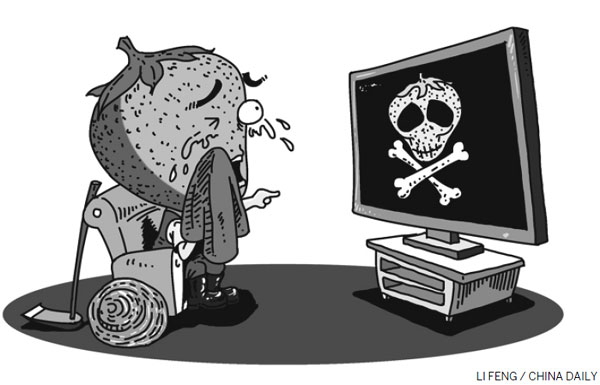A strawberry growers' association in Changfeng county, Anhui province, along with similar associations, is reportedly planning to file a lawsuit against China Central Television, because its report has caused huge losses to the strawberry industry. In Changfeng alone, farmers have suffered a loss of more than 150 million yuan ($24.17 million).
According to the CCTV report, eight samples of strawberries purchased randomly in Beijing contained excessive amounts of acetochlor, a herbicide that can be carcinogenic if consumed in large amounts.
Agricultural experts, however, say herbicides like acetochlor are hardly used by in China's strawberry fields. Chinese farmers generally grow strawberries using the plasticulture system: they form raised beds, fumigate and cover them with plastic sheets to prevent weed growth, and plant the plants through holes punched in the covering with irrigation tubes running underneath. The absence of weeds minimizes the use of herbicides.

After the CCTV report, agricultural authorities in Beijing and major strawberry growing provinces such as Shandong, Hebei, Liaoning and Zhejiang conducted several tests on random samples of the fruit but found no acetochlor. Despite these tests, however, strawberry sales in many areas have fallen sharply causing huge losses to farmers.
Food safety scandals cause instant public panic and a sharp decline in the consumption of the food in question. Since many food safety scandals have been exposed in recent years, Chinese consumers tend to believe a report if it has even the faintest hint of a food scandal. People have forgotten that experts have to conduct tests before it can be said for sure whether or not a food product is harmful.
It is important that media outlets desist from publishing reports on food scandals without scientific proof, because being unable to tell safe from unsafe food, consumers avoid all "doubtful" food products.
CCTV journalists bought strawberries at random in Beijing to select the samples. And there is no way to prove their test results were reliable. The onus is thus on media outlets to furnish accurate information and invite third-party agencies to carry out tests before publishing a report on a food scandal.

I’ve lived in China for quite a considerable time including my graduate school years, travelled and worked in a few cities and still choose my destination taking into consideration the density of smog or PM2.5 particulate matter in the region.